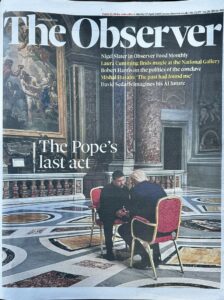Vatican Roulette

Screenshot
Terrific photograph, taken, I think, by Zelensky’s photographer.
It made a brilliant front page for the Observer in its latest incarnation.

Quote of the Day
”Writers have a rare power not given to anyone else: we can bore people long after we are dead.”
- Sinclair Lewis
Musical alternative to the morning’s radio news
Mozart| Kegelstatt-Trio KV498 1. Andante |
Played with historic instruments, so this is probably how Mozart heard it.
Long Read of the Day
Old ways of thinking about new problems
If you’re as pissed off as I am with the current fatuous discourse about ‘AGI’ (Artificial General Intelligence) then you’ll enjoy this marvellous essay by Rob Nelson.
Instead of treating AGI as something up for debate or assuming it (whatever it is) will happen one day, we should collectively giggle at the idea that a machine that applies probabilistic mathematics to giant cultural datasets can only be explained using the terminology of human cognition. As Cosma Shalizi pointed out, attention, as it is used in that famous paper, does not mean what you think it means. “Calling this “attention” [is] at best a joke. Actual human attention is selective.” Brad DeLong highlights this wonderful collection of insights about attention on his way to exposing the lazy thinking that anthropomorphizing large AI models affords otherwise smart people. DeLong offers his own “more accurate and useful framework,” which is “to understand LLMs as flexible interpolative functions from prompts to continuations.” Thinking in those terms requires greater cognitive effort than using the tired analogy of AI models as confabulation-prone research assistants or weird interns, but it has the benefit of agreeing with the reality of what we know about how large AI models actually work.
With every chatbot interaction, with every picture, song, or video generated, the evidence for understanding large AI models as social and cultural tools gets harder to ignore. Shalizi and DeLong are contributing to what Henry Farrell calls “a shared terrain of ideas coming into view,” which places generative AI within history rather than as the leading edge of an epoch-making inflection point that changes everything…
Do read it.
Footnotes:
-
Cosma Shalizi’s paper is here. It’s pretty arcane, but also a marvellous piece of scholarly thinking-aloud.
-
The ‘famous paper’ is the 2017 Google paper on the transformer model.
-
Brad DeLong’s essay is here.
-
The ‘tired analogy’ refers to Rob’s “Let’s Stop Treating LLMs like People”.
So many books, so little time
There’s an interesting passage in this conversation between Henry Oliver and the economist Tyler Cowen about reading.
Henry: Are there diminishing returns to reading fiction or what are the diminishing returns?
Tyler: It depends what you’re doing in life. There’s diminishing returns to most things in the sense that what you imbibe from your teen years through, say, your 30s will have a bigger impact on you than most of what you do later. I think that’s very, very hard to avoid, unless you’re an extreme late bloomer, to borrow a concept from you. As you get older, rereading gets better, I would say much better. You learn there are more things you want to read and you fill in the nooks and crannies of your understanding. That’s highly rewarding in a way where what you read when you were 23 could not have been. I’m okay with that bargain. I wouldn’t say it’s diminishing returns. I would say it’s altering returns. I think also when you’re in very strange historical periods, reading fiction is more valuable. During the Obama years, it felt to me that reading fiction was somewhat less interesting. During what you might call the Trump years, and many other strange things are going on with AI, people trying to strive for immortality, reading fiction is much more valuable because it’s more limited what nonfiction can tell you or teach you. I think right now we’re in a time where the returns to reading more fiction are rapidly rising in a good way. I’m not saying it’s good for the world, but it’s good for reading fiction.
I agree with him about fiction being more interesting and oddly relevant at the moment. Just after Trump was elected I chaired a discussion with a number of journalists at the Other Voices festival in Dingle on what we might expect from Trump 2.0. At the end of the event, I said to the audience that if they wanted some insight into what the future might be like then a good place to start might be Paul Lynch’s novel, Prophet Song. From what people have said to me subsequently, it was a good tip.
Remembering Julia

Julia Ball, a remarkable landscape painter — and a dear friend over many years — passed away in February. Monday’s Guardian carried a nice obituary of her by Elspeth Owen. Julia was a socialist and a committed feminist who took part in numerous political actions over the years: in support of the Grunwick demonstrators; the 1984-85 miners’ strike; CND; the Greenham Common peace camp; and in opposition to the Iraq war.
Linkblog
Something I noticed, while drinking from the Internet firehose.
- Yale’s administrator/student ratio seems to be approaching one-to-one.
In 2003, when 5,307 undergraduate students studied on campus, the University employed 3,500 administrators and managers. In 2019, before the COVID-19 pandemic’s effects on student enrollment, only 600 more students were living and studying at Yale, yet the number of administrators had risen by more than 1,500 — a nearly 45 percent hike. In 2018, The Chronicle of Higher Education found that Yale had the highest manager-to-student ratio of any Ivy League university, and the fifth highest in the nation among four-year private colleges.
Bureaucratisation is a pernicious disease of modern organisations, and it’s been chronic in universities worldwide. But this takes the biscuit.
This Blog is also available as an email three days a week. If you think that might suit you better, why not subscribe? One email on Mondays, Wednesdays and Fridays delivered to your inbox at 5am UK time. It’s free, and you can always unsubscribe if you conclude your inbox is full enough already!
